by Evropa Soberana
H.G. Wells (1866-1946) was an English writer and philosopher, particularly notable for his prolific science-fiction novels. Member of the Fabian Society, he followed a pseudo-leftist line.
And the ethical system of these men of the New Republic, the ethical system which will dominate the world state, will be shaped primarily to favour the procreation of what is fine and efficient and beautiful in humanity—beautiful and strong bodies, clear and powerful minds, and a growing body of knowledge—and to check the procreation of base and servile types, of fear-driven and cowardly souls, of all that is mean and ugly and bestial in the souls, bodies, or habits of men. (Anticipations of the Reaction of Mechanical and Scientific Progress upon Human Life and Thought, final chapter.)
I believe that if a canvass of the entire civilized world were put to the vote in this matter, the proposition that it is desirable that the better sort of people should intermarry and have plentiful children, and that the inferior sort of people should abstain from multiplication, would be carried by an overwhelming majority. They might disagree with Plato’s methods [The Republic, Book V], but they would certainly agree to his principle… Mr. Galton has drawn up certain definite proposals. He has suggested that ‘noble families’ should collect ‘fine specimens of humanity’ around them, employing these fine specimens in menial occupations of a light and comfortable sort, that will leave a sufficient portion of their energies free for the multiplication of their superior type. (Mankind in the Making, Chapter II).
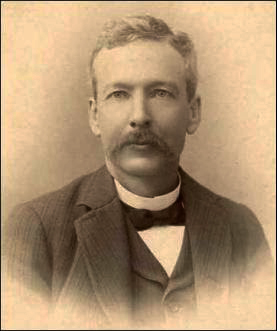 Luther Burbank (1849-1926), botanist, horticulturist and American farmer who patented legislation for plant breeders of food plants such as potatoes, peaches, plums, nectarines, walnuts, strawberries and a long etcetera. By his knowledge of the techniques of production of varieties, he also supported eugenics, not only in the botanical field, but also in the human to prevent criminals and the weak from reproducing.
Luther Burbank (1849-1926), botanist, horticulturist and American farmer who patented legislation for plant breeders of food plants such as potatoes, peaches, plums, nectarines, walnuts, strawberries and a long etcetera. By his knowledge of the techniques of production of varieties, he also supported eugenics, not only in the botanical field, but also in the human to prevent criminals and the weak from reproducing.
It would, if possible, be best absolutely to prohibit in every State in the Union the marriage of the physically, mentally and morally unfit. If we take a plant which we recognize as poisonous and cross it with another which is not poisonous and thus make the wholesome plant evil, so that it menaces all who come in contact with it, this is criminal enough. But suppose we blend together two poisonous plants and make a third even more virulent, a vegetable degenerate, and set their evil descendants adrift to multiply over the earth, are we not distinct foes to the race?
What, then, shall we say of two people of absolutely defined physical impairment who are allowed to marry and rear children? It is a crime against the state and every individual in the state. And if these physically degenerate are also morally degenerate, the crime becomes all the more appalling. (The Training of the Human Plant, Chapter VI, ‘Marriage of the Physically Unfit’.)
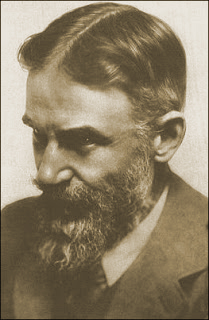 George Bernard Shaw (1856-1950), Irish writer awarded the Nobel Prize for literature in 1925, a supporter of that ‘other socialism’, more fascist and more Nazi, which led him to defend the Nietzschean concept of overman in his work Man and Superman. Bernard Shaw literally appealed to chemists to invent a gas that killed quickly and painlessly to dispose of the wastes of Western society. He was convinced that the only thing that could save civilisation was a eugenic religion and a socialist political system.
George Bernard Shaw (1856-1950), Irish writer awarded the Nobel Prize for literature in 1925, a supporter of that ‘other socialism’, more fascist and more Nazi, which led him to defend the Nietzschean concept of overman in his work Man and Superman. Bernard Shaw literally appealed to chemists to invent a gas that killed quickly and painlessly to dispose of the wastes of Western society. He was convinced that the only thing that could save civilisation was a eugenic religion and a socialist political system.
A part of eugenic politics would finally land us in an extensive use of the lethal chamber. A great many people would have to be put out of existence simply because it wastes other people’s time to look after them. (Address to the Eugenics Education Society, cited in The Daily Telegraph, March 4, 1910.)
Being cowards, we defeat natural selection under cover of philanthropy: being sluggards, we neglect artificial selection under cover of delicacy and morality (Man and Superman: A Comedy and a Philosophy).
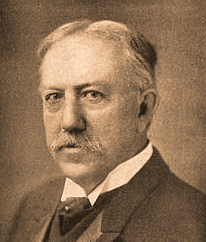 David S. Jordan (1851-1931), naturalist, educator, taxonomist, zoologist and American ichthyologist, president of the Indiana and Stanford universities and the London Zoological Society, professor of zoology and notorious pacifist who tried to avoid the unleashing of the First World War and that defined eugenics as ‘the art and science of being well born’. It was this man who, precisely during the First World War, invented the word ‘dysgenesic’ referring to the dysgenic effect of the war, where the country’s best young men died, leaving no offspring.
David S. Jordan (1851-1931), naturalist, educator, taxonomist, zoologist and American ichthyologist, president of the Indiana and Stanford universities and the London Zoological Society, professor of zoology and notorious pacifist who tried to avoid the unleashing of the First World War and that defined eugenics as ‘the art and science of being well born’. It was this man who, precisely during the First World War, invented the word ‘dysgenesic’ referring to the dysgenic effect of the war, where the country’s best young men died, leaving no offspring.
No doubt poverty, dirt and crime are bad assets in one’s early environment. No doubt these elements cause the ruin of thousands who, by heredity, were good material of civilization. But again, poverty, dirt, and crime are the products of those, in general, who are not good material. It is not the strength of the strong, but the weakness of the weak which engenders exploitation and tyranny. The slums are at once symptom, effect and cause of evil. Every vice stands in this same threefold relation. (The Heredity of Richard Roe: A Discussion of the Principles of Eugenics.)
Leonard Darwin (1850-1943), the youngest son of Charles Darwin, as well as a military and political man, economist and eugenicist. He was president of the Royal Geographical Society and directed the British Eugenics Society.
As an agency making for progress conscious selection must replace the blind forces of natural selection; and men must utilise all the knowledge acquired by studying the process of evolution in the past in order to promote moral and physical progress in the future. The nation which first takes this great work thoroughly in hand will surely not only win in all matters of international competition, but will be given a place of honour in the history of the world. (Presidential Address, First Eugenics Congress, 1912.)
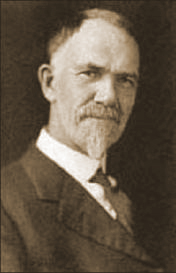 Charles Davenport (1866-1944), American biologist, geneticist and anti-communist professor at Harvard University and then Chicago. In 1902 he met Galton and Pearson with the intention of establishing a eugenic research laboratory in the US. In 1904 he succeeded in persuading the Carnegie Institute to donate $10 million to establish an ‘experimental evolution station’ in Cold Spring Harbor, Long Island, New York. In 1918 he founded, together with Grant, the Galton Society.
Charles Davenport (1866-1944), American biologist, geneticist and anti-communist professor at Harvard University and then Chicago. In 1902 he met Galton and Pearson with the intention of establishing a eugenic research laboratory in the US. In 1904 he succeeded in persuading the Carnegie Institute to donate $10 million to establish an ‘experimental evolution station’ in Cold Spring Harbor, Long Island, New York. In 1918 he founded, together with Grant, the Galton Society.
Davenport was concerned about the influence in America of elements from the South and East of Europe, which he considered inferior to those of the North and, especially, to the first English settlers, founding fathers and revolutionaries that in the world of eugenic America were considered the best lineage available to the country.
For having treated in a statistical and rigorous way the degeneration produced by the mixture of races (for example, in his book Race Crossing in Jamaica, 1929), he is considered today simply a representative of the ‘scientific racism’, as if this man would not have been, first of all, a scientist and also widely respected in his time. In the words of James Watson, the genius of modern genetics and controversial Nobel Prize, Davenport ‘wanted to prevent fit families from having unfit children’.
The general program of the eugenicist is clear. It is to improve the race by inducing young people to make a more reasonable selection of marriage mates; to fall in love intelligently. It also includes the control by the state of the propagation of the mentally incompetent (Heredity in Relation to Eugenics, 1911).
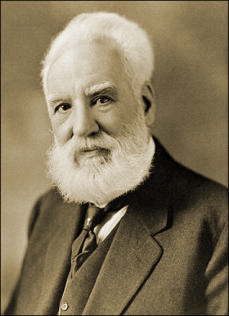 Alexander Graham Bell (1827-1922), Scottish inventor, speech therapist and scientist, the famous and acclaimed father of the telephone, pioneer of telecommunication technologies, co-founder of the National Geographic Association and also responsible for important advances in Aeronautics.
Alexander Graham Bell (1827-1922), Scottish inventor, speech therapist and scientist, the famous and acclaimed father of the telephone, pioneer of telecommunication technologies, co-founder of the National Geographic Association and also responsible for important advances in Aeronautics.
An enthusiast of eugenics, he was on the committee of the first International Eugenic Congress in 1911, and would be honorary president of the second in 1921. Organisations such as these advocated for the passage of laws that would establish forced sterilisation of persons considered, Bell called them, a ‘defective variety of the human race’.
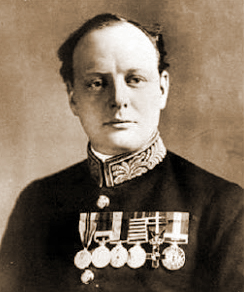 Winston Churchill (1874-1965). As Home Secretary he circulated a eugenic pamphlet entitled ‘The Feeble-minded: A Social Danger’. In 1910, he wrote to Prime Minister Herbert Asquith to defend a motion on the sterilisation of genetic inferiors. In 1912 he agreed to be vice-president of the First International Eugenics Congress in London.
Winston Churchill (1874-1965). As Home Secretary he circulated a eugenic pamphlet entitled ‘The Feeble-minded: A Social Danger’. In 1910, he wrote to Prime Minister Herbert Asquith to defend a motion on the sterilisation of genetic inferiors. In 1912 he agreed to be vice-president of the First International Eugenics Congress in London.
Subsequently, he praised both Hitler and Mussolini and then, placing himself under the Masonic umbrella, turned the United Kingdom into an anti-European stronghold. His later life, soaked in gin, is far from having the splendour that some try to attribute to him.
The unnatural and increasingly rapid growth of the Feeble-Minded and Insane classes, coupled as it is with a steady restriction among all the thrifty, energetic and superior stocks, constitutes a national and race danger which it is impossible to exaggerate. I am convinced that the multiplication of the Feeble-Minded, which is proceeding now at an artificial rate, unchecked by any of the old restraints of nature, and actually fostered by civilised conditions, is a terrible danger to the race (December of 1910).
Karl Pearson (1857-1936), English mathematician, historian and philosopher, as well as Galton’s disciple. Known for founding biostatistics, mathematical statistics and biometrics.
Gentlemen, I venture to think it is an antinomy, and will remain one until the nation at large recognises as a fundamental doctrine the principle that everyone, being born, has the right to live, but the right to live does not in itself convey the right to everyone to reproduce their kind. (Darwinism, Medical Progress and Eugenics, 1912.)
The garden of humanity is very full of weeds, nurture will never transform them into flowers; the eugenist calls upon the rulers of mankind to see that there shall be space in the garden, freed of weeds, for individuals and races of finer growth to develop with the full bloom possible to their species. I believe I am justified in the interpretation I have placed on Galton’s address… (Life and letters of Francis Galton, Volume III).
One reply on “Great personalities defend eugenics, 5”
A couple of days ago commenter Nemo, who hates me, commented on Occidental Dissent: “I work with farming in South America…”
Since the other guy who hates me (a VNN Forum’s Joe Smith) was recently doxxed as a mudblood, the mention of “South America” makes me suspect that the commenter could be renamed as “Nemo the Mudblood”.
Yes: I am a mudblood too. But the big difference is that I follow the advice of Faith and Action by Helmut Stellrecht for the Hitler Youth: “But if your blood has traits that will make your children unhappy and burdens to the state, then you have the heroic duty to be the last”.
Instead, these guys—together with the banned Dr Morales, a Brazilian who recently tried to post an insulting comment—fancy themselves as pure whites.
The experience I have had in Mexico with racist mudbloods is that they become mad as hell when I simply point out that our bloodlines may be compromised. Not even online Jews get as mad at me as the mudbloods (also called Meds, e.g., southern Italians).
I guess that with these translations I’m becoming their nemesis, especially because of what Charles Davenport says above.